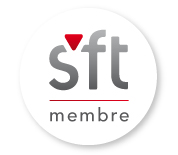“It is by speaking that one learns to speak”
A method of language learning based on more than a century of experience.
The immersion method qualifies in six words:
- Simple: Listen and repeat: you speak!
- Natural: It consists in creating a spontaneous reflex of thought and expression which completely immerse the student in the new language.
- Fast: It is based on the observation of situations and of the objects, and approaches the concrete by the visual example and the abstract by the association of ideas. Grammar is taught through examples and analogies. Reading and writing come next.
- Progressive: Its originality consists in associating ideas and words. Step by step, they become sentences, questions, answers, reports and a live dialogue is built. The method is based on a “block-building” approach.
- Exclusive: This method is developed and improved every year in educational research centres.
- Adaptable: The method aims to transform the theoretical knowledge into an ability to communicate effectively, through the implementation of interactive strategies, adapted to the requirements of the interlocutors.
During the session, only the language target is spoken in the classroom, the first session begins with the teacher’s greetings. The emphasis is on oral expression. Face to face with the trainer from the same country as the language she/he teaches, trainees are constantly encouraged to speak, they quickly enrich their vocabulary. To improve the mastering of the language, the trainees learn to think in this language instead of translating.
The immersion method has ten levels:
Functional knowledge (Levels 1-2)
Functional
Level 1:
The student is able to greet, to introduce him/herself or a third person. He/she understands simple questions and gives simple answers to familiar topics such as: the place where he/she lives, people he/she knows and the objects he/she owns. He/she can fill out a form with basic information. He/she is able to write and to speak about dates and numbers. He/she can express simple needs and understands an interlocutor, who speaks in simple terms, who speaks slowly and distinctly and who repeats. He/she is able to ask his/her way and to order at the restaurant.
Level 2:
The student can understand and transmits simple messages. He/she is able to manage daily information and to conduct usual face to face conversations employing the present, past and future tenses. He/she is able to describe or introduce people, daily actions (at home and at work). He/she can express his/her tastes using simple phrases and sentences.
He/she requests and understands information to satisfy his/her daily needs, such as to make purchases or a reservation for a travel, and takes routine messages over the telephone.
Intermediate knowledge (Levels 3-6)
Intermediate
Level 3:
The student is able to follow the general meaning of a conversation on topics that are familiar to him/her. It can initiate and hold a conversation covering a wide range of topics, even if he makes some mistakes.
He/she is able to participate to guided discussions, to give professional instructions, to expose a simple issue and to propose a solution. He/she can shows the premises to a third person or discuss about a project. He/she can extend an invitation and politely respond to it, present his/her congratulations, express preferences, agreement or disagreement, and make a complaint.
Level 4:
The student is able to understand information about topics that are familiar to him/her and follow a conversation sustained with several interlocutors on a wide range of general subjects. He/she can describe and purchase familiar equipment, negotiate an agreement or a work contract, establish professional contacts, take formal steps (visas, customs…), to give an advice and to express suggestions.
Upper intermediate
Level 5:
The student can conduct conversations on daily topics with relative ease. He/she can use complex sentences to perform narratives and descriptions. He/she can ask and answer questions related to his professional activity. He/she can give and describe instructions related to work processes and feels comfortable in most common social and professional situations. He/she can participate to discussions and meetings, to speak to ask for explanations or to express his/her opinion about a project. He/she can express him/herself on the quality of a product or a service. He/she can make assumptions and argue. He/she knows how to handle the basic grammatical structures, he/she use some structure more sophisticated and correctly uses verbal forms.
Level 6:
The student is capable of communicate easily and efficiently in numerous professional and personal contexts. He/she has sufficient vocabulary to formulate his thought in a nuanced way. He/she manage complex situations and can ask his/her interlocutor to repeat in case of need. He/she participates with ease to conversations involving several people. He grasps the general meaning of a meeting and is able to intervene. He/she can face to more complex situations, such as consult a lawyer or an accountant, and discuss about a project. He/she is able to express his/her requests, opinions or ideas. He/she can hold long telephone conversations, organise his/her travels and respond to unexpected problems.
Advanced and professional knowledge (Levels 7-10)
Advanced
Level 7:
The student is capable of producing, initiating and maintaining spontaneous exchanges, with the help of periphrasis if necessary. He/she can express his/her opinions and defend his ideas during a discussion. He/she can understand idiomatic expressions. He/she is operational in a professional situation and able to lead a department. He/she can resolve a disagreement and use the appropriate terms to handle most professional situations. He/she can present and summarize his/her ideas to a group with a little supervision. He/she can use the target language in more complex situations and for learning in other areas, whether personal or professional.
Level 8:
The student can communicate effectively and accurately in complex communication situations, such as chairing a meeting, for example. He/she participates with ease in conversations of a social and professional nature. He/she is able to easily handle most questions over the phone. He/she can receive clients, write a report, and make a professional or commercial presentation at a meeting. He/she express him/herself with ease and in a nuanced way and can easily understand a discourse even within a complex subject.
Professional
Level 9:
The Student can communicate effectively with interlocutors from all walks of life about a wide range of topics, whether familiar or unknown, personal or professional. He/she is able to participate effectively and comfortably to debates and to attend meetings. He/she can present and defend his/her ideas to a discussion group and organize a work session by telephone. He/she can make descriptions and presentations in a clear and detailed manner and express him/herself with style and nuance on different subjects, even complex ones.
Level 10:
During a speech, the student is able to develop his/her ideas in a clear and coherent way. He/she has a mastery of the language comparable to that of a native in situations related to his/her activity. He/she understand a discourse at a very high analytical and critical level. He/she understand the cultural references in a way that demonstrate a good mastery of social conventions of the language spoken. He/she participates with ease in most formal and informal conversations. He/she can explain in detail concrete or abstract concepts and formulate hypotheses using elaborate constructions. He/she can argue skilfully on controversial topics. He/she is capable to prepare complex reports on subjects related to his/her professional domain.
Serafina LOGGIA is the author of this article, you can use the contents mentioning the source.





